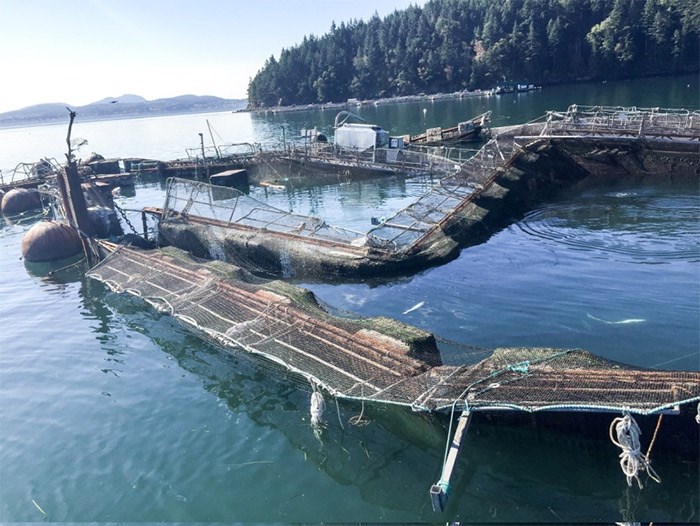SEATTLE — The Washington state Department of Natural Resources said Monday it will not renew a fish-farming company’s last remaining leases on net pens in Puget Sound.
Department officials said Cooke Aquaculture has until Dec. 14 to finish steelhead farming and start deconstructing its equipment, The Seattle Times reported. Cooke’s pens are located in Rich Passage near Bainbridge Island and Hope Island in Skagit Bay.
Letters sent from the Department of Natural Resources to the Canada-based company on Monday indicate Cooke had a history of failing to comply with the provisions outlined in contracts. Cooke didn’t comment on the decision, but a representative told the newspaper the company may do so later.
The decision not to renew the leases stems from a 2017 spill of tens of thousands of nonnative Atlantic salmon after a pen break at Cypress Island, near the San Juan Islands.
The New Brunswick, Canada-based company vastly underreported the number of escaped fish, a state investigation found.
Investigators found as many as 263,000 of the farm’s fish escaped, not the 160,000 Cooke told the public. Months after the spill, more than 200,000 were still reportedly unaccounted for.
An inspection revealed Cooke’s Port Angeles Atlantic salmon farm wasn’t adequately maintained and was outside its leasehold boundaries. Cooke challenged the decision in court, but a Thurston County Superior Court judge ruled in favor of state regulators. Cook lost its lease to operate the salmon farm.
The state legislature in 2018 passed a law effectively phasing out net pen farming of exotic species in Washington waters.
Cooke pivoted to raise steelhead but Department of Natural Resources officials determined that Cooke’s operations could pose risks to the state’s environment, according to the letters.
Feeding fish in concentrated areas releases nutrients and organic matter that can contribute to algae production, state officials wrote. And fish feces can degrade the ocean floor environment.
“Today, we are returning our waters to wild fish and natural habitat,” Hilary Franz, the state public lands commissioner, said in a statement. “Today, we are freeing Puget Sound of enclosed cages.”
Franz had ordered the inspections of Cooke’s facilities after the 2017 escape incident, which sparked calls to end non-native fish farming in Washington — with 20 Western Washington treaty tribes at the forefront.
Swinomish leaders told the Department of Natural Resources that the Hope Island net pens were adversely impacting fish and fish habitat in Skagit Bay, and that the pens were located near Lone Tree Point, a sacred cultural area for the tribe.
“Swinomish are the People of the Salmon, and fishing has been our way of life since time immemorial,” Swinomish tribal community chairperson Steve Edwards wrote in an email. “Cooke’s net pens have interfered with the exercise of our treaty rights for far too long. We look forward to the day when the Hope Island net pen facility will be a distant memory.”



